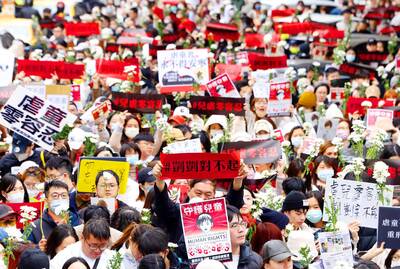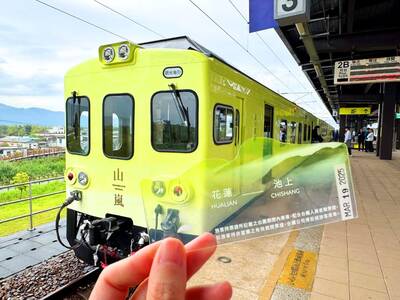Liberty Times (LT): As the first minister-without-portfolio specifically tasked with digital affairs, can you elaborate on what you intended to achieve when you took the job?
Audrey Tang (唐鳳): The position of minister-without-portfolio for digital affairs means that it is not just a one-person job and that everyone can, through digital systems and technology, help resolve governmental affairs.
We have made public on the PDIS.tw Web site our visits with those who are interested in sharing their views and each meeting the government has held. We hope to better integrate the collective wisdom and strengths of the people to help the government.

Photo: Fang Pin-chao, Taipei Times
LT: You have always been a supporter of an “open government.” What are your goals for establishing digital information management to that end?
Tang: The goal of digital management is to digitize all executive affairs. If everything is on paper it sits on desks or the computers of the people working on the file, which makes it impossible to render transparent. Therefore, the next step is to share the data on which we base our decisions in a transparent manner.
Next is the matter of accountability. For every opinion that is raised, for everything that happens in each stage, we must have the same response.
Last is inclusiveness, which allows everyone to participate and not just those who are knowledgeable in code or law.
LT: You are an avid user of the Internet, though which you are connected to global trends. How can Taiwan’s policies, or hardware construction, on digital information policies keep up with such trends?
Tang: In terms of “keeping abreast of trends,” I would say that we should not consider competitiveness as a competition with others, but rather as point of comparison with what we want to do and what we are capable of.
In terms of policy, the draft regulations on innovative financial technological experimentation, the draft act on digital communication and media, and the draft act on recruiting and hiring professional foreigners are all policies that have emerged under the joint discussion of those who would benefit from the passage of the laws. We hope that should these laws be implemented, it would help enable innovation in Taiwan.
In terms of infrastructure, the majority have considered issues on informational security, digital equality, transparent content, common service portals and machine collaborations important. Therefore, under the proposed Forward-looking Infrastructure Development Program, we have allocated funding of a four-year program to build infrastructure for those issues.
LT: How would governmental services transition into a digital format? How would such policies reach and influence the public?
Tang: Take the Taiwan High Speed Rail iTaiwan free Wi-Fi connection for example. It has been installed in 177 carriages and just last week was used by more than 10,000 people. More carriages are to be outfitted with such services.
I think that for the public to feel that something is done, they would have to raise the issues that they feel must be changed. Therefore, people should make their ideas known through online participation on public policies forums. Then they could actually see and discuss what is being changed.
LT: The Internet speed in Taiwan has fallen behind that of South Korea and Japan, while the coverage of Wi-Fi services in metropolises cannot compare with China. Were it not for this year’s Universiade, the issue of information “blind corners” on the Taiwan High Speed Rail would not have been addressed. Do you feel this is too slow a process?
Tang: I have always thought that if the value of thing is established on comparison, then we are forever helpless, because there will always be instability.
The crux is what kind of services everyone hopes to have and how such services are provided by different sectors. If broadband reception is something we feel is important, than it should be gradually implemented, regardless of whether it is in urban or rural areas. This, like information security, is very basic in terms of digital infrastructure.
LT: It has been almost a year since you accepted your position. From your observations, what digital advantages does Taiwan have and how long can they continue to be in the lead? Are there any issues that the government knows should be addressed, but cannot afford to?
Tang: Taiwan has had ample experience in the integration and use of the Internet, whether among society or private corporations. Such an advantage can be used in cross-sector integration.
In practice, even if people do not trust the government, the government should trust the people. Under such a premise, we will gradually make transparent the information on which we base our policy decisions and implementation for discussion among the public. Only then can we achieve consensus.
Translated by staff writer Jake Chung

Taiwan yesterday condemned the recent increase in Chinese coast guard-escorted fishing vessels operating illegally in waters around the Pratas Islands (Dongsha Islands, 東沙群島) in the South China Sea. Unusually large groupings of Chinese fishing vessels began to appear around the islands on Feb. 15, when at least six motherships and 29 smaller boats were sighted, the Coast Guard Administration (CGA) said in a news release. While CGA vessels were dispatched to expel the Chinese boats, Chinese coast guard ships trespassed into Taiwan’s restricted waters and unsuccessfully attempted to interfere, the CGA said. Due to the provocation, the CGA initiated an operation to increase

A crowd of over 200 people gathered outside the Taipei District Court as two sisters indicted for abusing a 1-year-old boy to death attended a preliminary hearing in the case yesterday afternoon. The crowd held up signs and chanted slogans calling for aggravated penalties in child abuse cases and asking for no bail and “capital punishment.” They also held white flowers in memory of the boy, nicknamed Kai Kai (剴剴), who was allegedly tortured to death by the sisters in December 2023. The boy died four months after being placed in full-time foster care with the

CHANGING LANDSCAPE: Many of the part-time programs for educators were no longer needed, as many teachers obtain a graduate degree before joining the workforce, experts said Taiwanese universities this year canceled 86 programs, Ministry of Education data showed, with educators attributing the closures to the nation’s low birthrate as well as shifting trends. Fifty-three of the shuttered programs were part-time postgraduate degree programs, about 62 percent of the total, the most in the past five years, the data showed. National Taiwan Normal University (NTNU) discontinued the most part-time master’s programs, at 16: chemistry, life science, earth science, physics, fine arts, music, special education, health promotion and health education, educational psychology and counseling, education, design, Chinese as a second language, library and information sciences, mechatronics engineering, history, physical education

The Shanlan Express (山嵐號), or “Mountain Mist Express,” is scheduled to launch on April 19 as part of the centennial celebration of the inauguration of the Taitung Line. The tourism express train was renovated from the Taiwan Railway Corp’s EMU500 commuter trains. It has four carriages and a seating capacity of 60 passengers. Lion Travel is arranging railway tours for the express service. Several news outlets were invited to experience the pilot tour on the new express train service, which is to operate between Hualien Railway Station and Chihshang (池上) Railway Station in Taitung County. It would also be the first tourism service